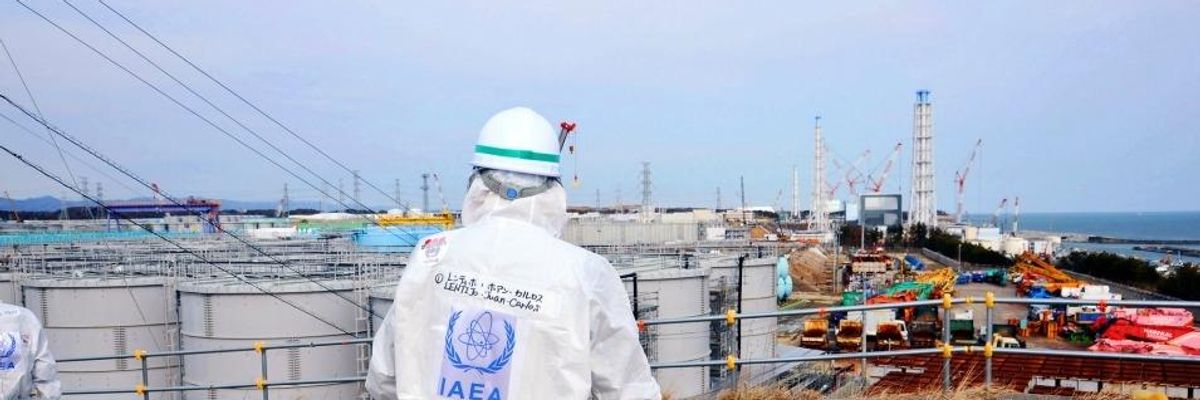
A member of the IAEA mission reviewing the Fukushima Daiichi Nuclear Power Station in February 2015, Tokyo, Japan. (Photo: Susanna Loof / IAEA via flickr)
To donate by check, phone, or other method, see our More Ways to Give page.

A member of the IAEA mission reviewing the Fukushima Daiichi Nuclear Power Station in February 2015, Tokyo, Japan. (Photo: Susanna Loof / IAEA via flickr)
Striking a blow to local residents opposed to nuclear power, a Japanese court on Wednesday green-lighted the reopening of the Sendai power station, in a ruling that could clear the way for the return of this widely-opposed energy source four years after the Fukushima crisis began.
In the ruling, the Kagoshima District Court rejected a formal attempt by residents to prevent the restarting of two reactors at the plant. The residents had cited safety concerns.
The outcome diverged from a separate court decision last week, in which judges ruled in favor of residents seeking an injunction against the restart of reactors at the Takahama plant.
According toReuters, local residents who had formally requested that the plant not be restarted gathered outside the Kagoshima court and "let out a collective sigh when the decision was announced."
Hiroyuki Kawai, the lead lawyer for the plaintiffs, denounced the decision: "We will not give in, we will continue fighting. We will not let our emotions be swayed by any short-term results and we will fight until we get rid of all nuclear reactors in Japan."
According to the Guardian, Wednesday's court decision "leaves Kyushu Electric Power, the operator of Sendai nuclear power plant, with just one more regulatory obstacle to overcome before it can restart the two reactors, possibly as early as June."
If the Sendai plant were to reopen, it would mark the first restart since the industry was halted nation-wide following the Fukushima meltdown.
The majority of people in Japan oppose the restart of Japan's nuclear power plants.
Common Dreams is powered by optimists who believe in the power of informed and engaged citizens to ignite and enact change to make the world a better place. We're hundreds of thousands strong, but every single supporter makes the difference. Your contribution supports this bold media model—free, independent, and dedicated to reporting the facts every day. Stand with us in the fight for economic equality, social justice, human rights, and a more sustainable future. As a people-powered nonprofit news outlet, we cover the issues the corporate media never will. |
Striking a blow to local residents opposed to nuclear power, a Japanese court on Wednesday green-lighted the reopening of the Sendai power station, in a ruling that could clear the way for the return of this widely-opposed energy source four years after the Fukushima crisis began.
In the ruling, the Kagoshima District Court rejected a formal attempt by residents to prevent the restarting of two reactors at the plant. The residents had cited safety concerns.
The outcome diverged from a separate court decision last week, in which judges ruled in favor of residents seeking an injunction against the restart of reactors at the Takahama plant.
According toReuters, local residents who had formally requested that the plant not be restarted gathered outside the Kagoshima court and "let out a collective sigh when the decision was announced."
Hiroyuki Kawai, the lead lawyer for the plaintiffs, denounced the decision: "We will not give in, we will continue fighting. We will not let our emotions be swayed by any short-term results and we will fight until we get rid of all nuclear reactors in Japan."
According to the Guardian, Wednesday's court decision "leaves Kyushu Electric Power, the operator of Sendai nuclear power plant, with just one more regulatory obstacle to overcome before it can restart the two reactors, possibly as early as June."
If the Sendai plant were to reopen, it would mark the first restart since the industry was halted nation-wide following the Fukushima meltdown.
The majority of people in Japan oppose the restart of Japan's nuclear power plants.
Striking a blow to local residents opposed to nuclear power, a Japanese court on Wednesday green-lighted the reopening of the Sendai power station, in a ruling that could clear the way for the return of this widely-opposed energy source four years after the Fukushima crisis began.
In the ruling, the Kagoshima District Court rejected a formal attempt by residents to prevent the restarting of two reactors at the plant. The residents had cited safety concerns.
The outcome diverged from a separate court decision last week, in which judges ruled in favor of residents seeking an injunction against the restart of reactors at the Takahama plant.
According toReuters, local residents who had formally requested that the plant not be restarted gathered outside the Kagoshima court and "let out a collective sigh when the decision was announced."
Hiroyuki Kawai, the lead lawyer for the plaintiffs, denounced the decision: "We will not give in, we will continue fighting. We will not let our emotions be swayed by any short-term results and we will fight until we get rid of all nuclear reactors in Japan."
According to the Guardian, Wednesday's court decision "leaves Kyushu Electric Power, the operator of Sendai nuclear power plant, with just one more regulatory obstacle to overcome before it can restart the two reactors, possibly as early as June."
If the Sendai plant were to reopen, it would mark the first restart since the industry was halted nation-wide following the Fukushima meltdown.
The majority of people in Japan oppose the restart of Japan's nuclear power plants.